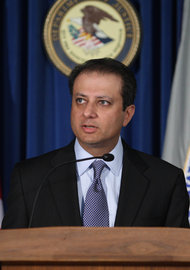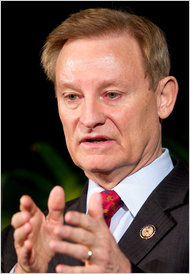A former analyst at SAC Capital Advisors who has become a crucial informant in the government’s insider trading investigations avoided prison on Wednesday after a judge sentenced him to probation.
The former analyst, Wesley Wang, cooperated with the authorities and provided them with the names of about 20 people he said had engaged in criminal activity. He secretly recorded telephone conversations and wore a wire in meetings with former friends and colleagues. His role in the government’s inquiry, prosecutors said, has led to 10 convictions.
Judge Jed S. Rakoff, who presided over the sentencing in Federal District Court in Manhattan, said he spared Mr. Wang because of his exceptional assistance.
“I take it that Mr. Wang’s cooperation has been extraordinary,” Judge Rakoff said. “Not just substantial, but going beyond substantial.”
Mr. Wang, 39, is the latest government informant in the insider trading investigations to receive a noncustodial sentence. His lenient penalty highlights the benefits of cooperating.
Judge Rakoff noted the crucial role of cooperators — and the lenient punishments they receive — in the American legal system.
“Prosecutors,” he said, “could not achieve the major successes they’ve achieved in complex crimes like insider trading without asking judges to give a very substantial benefit to cooperators.”
The Justice Department has aggressively relied on cooperation agreements in its multiyear campaign to eliminate insider trading. And a number of those defendants have led the authorities to illegal conduct at Mr. Wang’s former employer, SAC Capital Advisors, the $14 billion hedge fund run by Steven A. Cohen, one of the country’s wealthiest men. Mr. Cohen has not been charged with any wrongdoing and has told his investors that he believes he at all times acted appropriately.
At least two former SAC employees continue to assist authorities in their investigation of SAC. Jon Horvath, a onetime SAC tech-stock analyst, pleaded guilty last fall and said in court that he traded on inside information along with his boss, Michael Steinberg, an SAC portfolio manager and top lieutenant to Mr. Cohen. Prosecutors have named Mr. Steinberg as a co-conspirator but have not filed criminal charges against him. His lawyer declined to comment.
Another former SAC employee-turned-informant, Noah Freeman, also admitted to insider trading while at the fund. Testifying in a case last year, Mr. Freeman said he gave the government the names of 12 individuals he believed engaged in criminal conduct.
Federal Bureau of Investigation agents have tried to gain the cooperation of Mathew Martoma, a former SAC portfolio manager indicted last month in a $276 million insider trading prosecution. The case, for the first time, ties Mr. Cohen to the questionable trades. Mr. Martoma has rebuffed the government’s overtures and pleaded not guilty.
Mr. Wang, in contrast, began cooperating almost immediately after being approached by F.B.I. agents in January 2009.
Over the course of a decade, Mr. Wang had an undistinguished career, bouncing around at low-level jobs at investment banks and hedge funds. Based in Berkeley, Calif., Mr. Wang was part of a clique of technology industry analysts who trafficked in secret information about publicly traded technology companies.
His cooperation “has yielded tremendous results,” said prosecutors in a letter to the judge before sentencing.
“Indeed, even today, the fruits of Wang’s cooperation are being realized.”
Among the people Mr. Wang named was his SAC boss, Dipak Patel. He said he passed confidential data about technology companies to Mr. Patel, according to a court filing. Mr. Patel, who has not been charged, left SAC in 2011 and could not be reached.
Mr. Wang’s lawyer, Michael D. Celio, told Judge Rakoff that his client’s legal predicament had taken its toll. “He has walked away from friends,” Mr. Celio said. “He finds himself isolated and broke.”
Standing before the judge, Mr. Wang said, “I’m disappointed in myself and I am trying, in all efforts, to make up for the mistakes I made in the past and leave my old life behind.”
Prosecutors effusively praised Mr. Wang’s assistance, highlighting his testimony during last summer’s trial of the hedge fund manager Douglas Whitman of Whitman Capital, who was convicted.
“On one instance, Wang flew from California to New York the weekend before his testimony to meet with prosecutors despite having a very sick dog who had just undergone surgery and was recovering,” the prosecutors wrote in the letter to Judge Rakoff. “At the time Wang was living alone and was very close with his dog, who was Wang’s primary companion.”
Article source: http://dealbook.nytimes.com/2013/01/09/probation-for-ex-sac-analyst-who-cooperated-in-insider-trading-inquiries/?partner=rss&emc=rss


